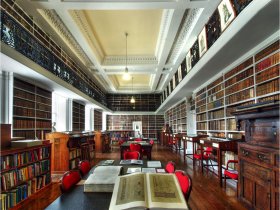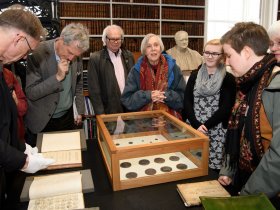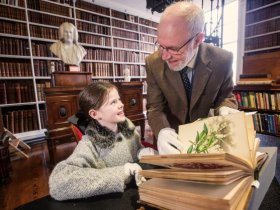Stay in touch with the latest news from AIM and get information on sector grants, jobs and events with our free fortnightly E-News.
Museum profile – Armagh Robinson Library
Armagh Robinson Library is the oldest public library in Northern Ireland. It was founded in 1771 by Richard Robinson, Archbishop of Armagh and Primate of All Ireland, who gifted his collection of books and fine art to the people of Armagh. It was the first of several public buildings that Robinson had erected in Armagh over a twenty-year period. The architect for the Library’s building was the English-born, Thomas Cooley. To accommodate the growing collection, the building was extended at each end in the mid-1840s, according to a design by Robert Law Monsarrat.
The Library retains the collections provided by Archbishop Robinson, which include approximately 8,000 books, as well as Roman and Medieval coins, casts of medals from the reign of Louis XIV and more than 3,000 gems created by James Tassie. There is also Robinson’s exquisite collection of over 4,000 (mainly loose) prints and engravings, which span the sixteenth to eighteenth centuries and include examples of the work of the foremost printmakers operating in early modern Europe.
Over the years the collections have grown through donations and purchases. Today there are over 46,000 printed works, of which almost half were published before 1800. The earliest books date from the 1480s. Among the holdings are many first editions and other rarities, for instance, Sir Walter Raleigh’s Discoverie of Guiana (1596) and his History of the World (1614), as well as Jonathan Swift’s personal, annotated copy of Gulliver’s Travels (1726).
In addition, the Library has over 300 manuscript collections, ranging in date from the thirteenth to late twentieth centuries. Examples of non-book treasures are on display nearby at No 5 Vicars’ Hill, the former Armagh Diocesan Registry, which is owned by the Library. These include antiquities such as polished stone axe heads, Bronze Age weapons and adornments, and medieval handbells which were used in early Christian worship in Ireland.
The Library is governed by an Act of the Irish Parliament, which received royal assent in 1774. It established a Board of Governors and Guardians made up of the Church of Ireland Archbishop, Dean and Chapter of the Cathedral Church of St Patrick, Armagh, along with two lay members of the Diocese of Armagh. The Library’s team consists of the Keeper, Assistant Keeper, Administrative Officer, Archivist and Cleaning Supervisor. There are also temporary posts related to specific externally funded projects. In addition, a wonderful team of volunteers undertake various tasks, including cleaning the books, cataloguing and helping at events and special open days.
The Library and No 5 Vicars’ Hill annually welcome approximately 12,000 visitors. Admission is free, with a modest fee requested for guided group tours. Visitors include local people, as well as tourists, school pupils and researchers. There is an active programme of temporary exhibitions and in-person and online events. Recordings of previous talks can be found on the Library’s YouTube channel, and digital versions of past exhibitions can be found on the website.
An accredited museum since 2001, the Library remains an independent institution. It receives no public funding towards its core costs, which for over 250 years have been met by an endowment provided by Archbishop Robinson. With increasing costs, the endowment has needed additional support which has been greatly helped recently through an endowment appeal. The National Lottery Heritage Fund matched all donations the Library raised, supported by Ulster Garden Villages Ltd. The Library can still be supported through its Adopt a Book/Shelf Scheme.
In 2019 the Library made it into The Lonely Planet Guide’s ‘Top 500 Places to Visit in the United Kingdom’, being one of only twenty venues in Northern Ireland to feature. Above the Library entrance there is a Greek inscription, which was chosen by Archbishop Robinson. Translated, it reads, ‘The Healing Place of the Soul.’ All are welcome to visit and experience that for themselves.
Click here to visit the Armagh Robinson Library website>>



